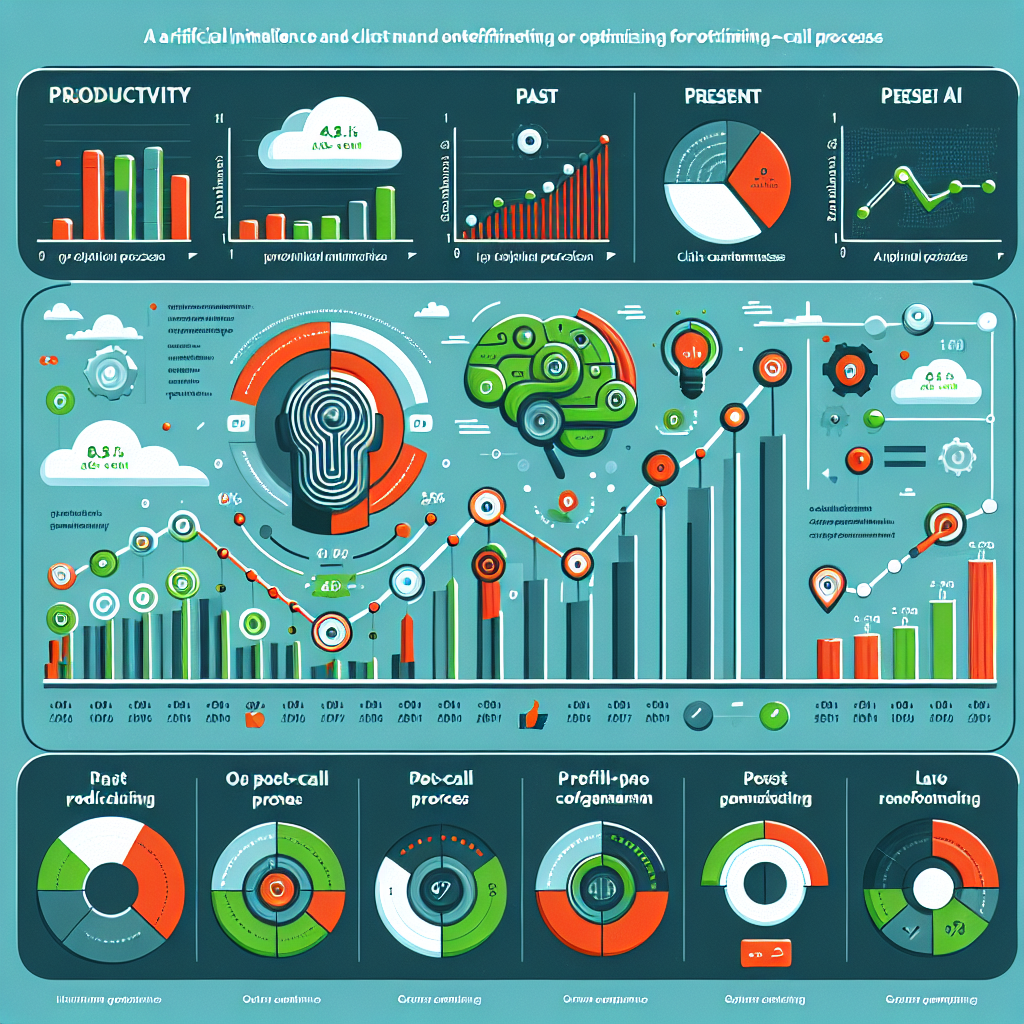
Post-call workflow optimization is a challenge companies are facing in managing and enhancing customer services. After every customer interaction, agents need to spend significant chunks of time making call notes and updating numerous CRM fields manually. This post-call work time often extends after official working hours affecting their efficiency and overall productivity.

Fret not! Help is at hand in the form of Artificial Intelligence (AI). AI is revolutionizing post-call work optimization by employing automation, real-time transcription services, and sentiment analysis. Reducing the time spent on after-call work not only expedites processes but also significantly reduces agent exhaustion, ensuring better customer interaction and increased agent productivity .
In the ensuing wave of digital transformation, AI is rapidly gaining traction. Apart from making post-call work easier for agents, AI also helps in obtaining better CRM analytics by inputting accurate and relevant information without human errors. This helps organizations have a clear understanding of the customer journey, helping them make informed business decisions.
The role of AI in reducing manual input and optimizing the post-call workflow cannot be overstated. For companies to remain competitive, embracing this technology is no longer a choice but a necessity. In the subsequent sections, a detailed dive into how AI is playing this pivotal role will be made.
As call centers consistently undergo technological evolutions, efforts to optimize Post-Call Work Time and improve documentation have gained overwhelmingly positive traction. Artificial Intelligence (AI) is at the forefront of these advancements, empowering businesses to streamline their operations, speed up response times, and enhance customer satisfaction.
One crucial AI subset that holds immense value for call centers is Natural Language Processing (NLP), a technology that allows machines to understand, interpret, and generate human language. Using NLP, AI can transcribe and analyze the vital data found in customer calls, identifying key patterns and insights to inform future interactions.
The power of NLP converges with speech-to-text technology to revolutionize post-call documentation. Transcribing every customer call manually is not only time-consuming but also fraught with potential human error. Speech-to-text, however, is able to swiftly convert call audio into written records, significantly reducing transcription times.
But it doesn't stop there. The integration of AI-powered categorization bolsters the usefulness of this verbal to written conversion. AI algorithms are capable of categorizing calls automatically based on the transcriptions. This reduces the burden of manually sorting through documents, enabling customer service representatives to swiftly locate pertinent information.
Tapping into the potential of AI technologies such as NLP and speech-to-text not only optimizes Post-Call Work Time but the accuracy and efficiency of documentation as well. Reducing the pressures of manual transcription and categorization creates a more organized, streamlined call center environment—equipping businesses to better serve their customers and meet their needs.
Integrating AI with CRM Systems is a strategic move that is shaping the future of customer service. Utilizing artificial intelligence empowers businesses to automate the process of maintaining accurate customer records within their Customer Relationship Management (CRM) systems, reducing the time spent on post-call administration tasks and increasing productivity.
This integration has made a huge difference in the way service teams manage follow-ups and formulates their customer service strategies. AI, with its sophisticated algorithms, proactively scans and updates the CRM data, ensuring up-to-date insights about customers that orients customer service approaches towards individual customer needs and preferences.
CRM platforms often come integrated with AI features designed to improve efficiency. These AI capabilities can predict customer behavior, process large volumes of data, and generate actionable insights. This AI-powered automation of processes helps recover valuable time that can be spent on more complex tasks, enhancing the overall service delivery.
Furthermore, AI is not just limited to updating customer records. It also comes in handy during real-time vox conversations. Voice recognition technology backed by AI can analyze calls, identify customer requirements, and automatically update the necessary CRM fields. This lessens the manual workload and decreases the possibility of human errors.
Gartner's research states that 89% of businesses compete on the basis of customer experience alone. Hence, integrating data-rich, insight-driven AI with CRM systems is a worthy strategic decision as it can help enterprises streamline their follow-ups and customer service strategies while taking customer experience to new heights.
In a nutshell, AI and CRM integration is not just about replacing human effort but maximizing efficiency and accuracy in managing customer relationships. This powerful union is shaping the future of customer service as we know it.
An emerging trend in many organizations today is the use of Artificial Intelligence (AI) to refine and optimize Post-Call Work Time and Documentation. One transformative application of AI in this aspect is Real-Time Data Synthesis and Reporting. By compiling and analyzing call data in real time, AI produces actionable insights and comprehensive reports that aid in decision-making processes within organizations.
AI technologies like Speech-To-Text transcriptions convert all dialogue during a call into text, providing an accurate record of the entire conversation. Then, AI algorithms like Natural Language Processing (NLP) analyze the content of the conversation to record key details, identify trends, and predict outcomes.
Once the call concludes, AI-powered systems can automatically categorize the call based on the issues discussed and generate actions items, thereby reducing manual error and saving valuable time. Furthermore, the system can even suggest follow-up actions, improving the overall response time for customer queries or concerns.
Simultaneously, these AI systems can generate a comprehensive report detailing key call metrics, issues discussed, time spent per call, and more. This information, combined with analytics, can provide insights into call handling efficiency, common customer grievances, and areas of operational improvement. Managers can leverage this data to make informed decisions, enhance processes, and improve the overall service quality.
In conclusion, integrating AI in Post-Call work time and documentation not only streamlines back-office operations but also offers a wealth of real-time data, spurring strategic, data-driven decision making. As the technology continues to evolve, organizations committing to its adoption stand to gain a considerable edge over their competitors in the long run.
Artificial Intelligence has significantly transformed the communication industry in terms of managing essential post-call work and documentation. As part of this transformation, businesses of all sizes have found innovative ways to streamline their customer support service delivery. Let's look at a few real-world case studies showcasing AI's role in post-call optimization.

IBM assists businesses in improving quality and productivity by analyzing the success and failure of customer interactions. Its advanced AI solutions help companies reduce errors and omissions in their post-call documentation, thereby enhancing overall efficiency and customer satisfaction.
Another compelling case is that of Haptik's deployment for providing customer support over WhatsApp. Their AI model significantly decreased the proportion of messages requiring manual tagging, which directly resulted in optimized post-call work. This transition led to a marked improvement in agent productivity and resulted in notable cost savings.
Amelia, an AI software developed by IPsoft, offers another shining example of the power of AI in optimizing post-call work. By automating basic tasks and proactively proposing relevant solutions, Amelia was able to reduce the average call handling time, increasing the productivity of customer service representatives and improving the customer experience.
In conclusion, these case studies vividly illustrate the potential of AI for post-call optimization. Not only does it drastically reduce the time spent on post-call documentation, but it also aids in providing better customer service by analyzing interaction data in real time.
The dawn of AI technologies is reshaping every aspect of our lives, including how businesses operate. Specifically, in the area of customer service, AI is being employed to streamline workflows and improve productivity. One area that has been greatly influenced is post-call work, a crucial part of the job that involves analysis, documentation, and follow-ups.
Significant progress has been made with automated transcription services, predictive analysis, and machine learning algorithms designed to decipher complex interactions. AI-powered digital assistants are now capable of wrapping up calls, cataloging them, and even suggesting possible responses, all within seconds. These advancements not only save time but also lessen the load on customer service representatives, allowing them to maintain excellent service standards without feeling overwhelmed.
One of the most promising future trends in AI for post-call work lies in machine learning and natural language processing (NLP). Over time, we can expect these AI-enabled devices to better understand colloquial language, tones, emotions, and even cultural nuances. Their potential to learn from every call and continuously improve their interactions is a game-changer. This could result in more accurate incident reports and even more optimized post-call workflows.
Lastly, the future of post-call work seems to be heading toward predictive analytics. By analyzing current trends, historical data, and ongoing activities, AI can help predict customer behavior, anticipate issues, and determine the best course of action. These AI-driven insights can drastically cut down the post-call work time, revolutionize customer service experience, and boost the company's overall productivity.
Certainly, the future trends in AI present countless opportunities for real-time optimization of post-call work and documentation. However, organizations must be mindful of aligning these technologies with their customer service strategy to reap the maximum benefits.
Start your free trial for My AI Front Desk today, it takes minutes to setup!








